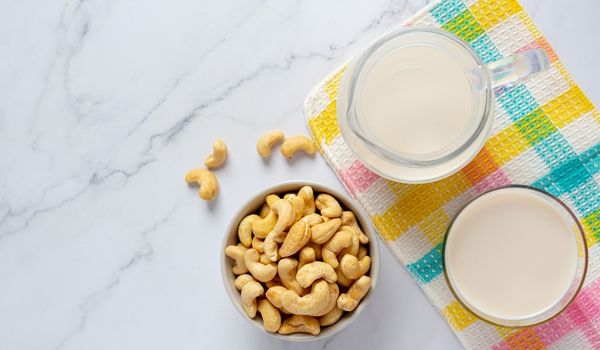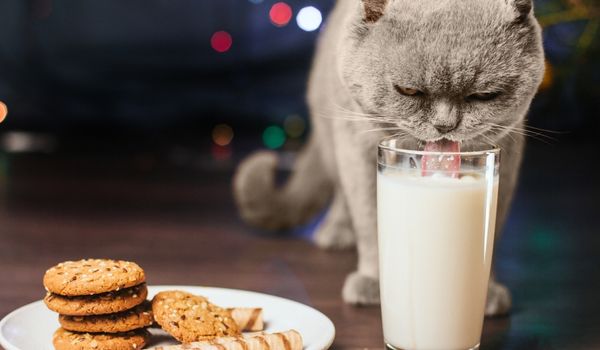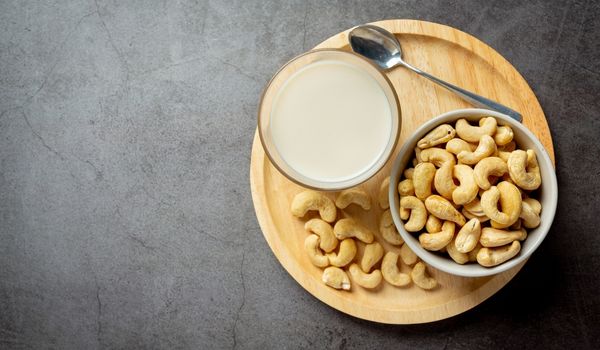People have started to take their health more seriously. They now find alternatives to foods they could previously not enjoy due to allergies. They also wish their families, including their pets, to tag along.
So, if you are lactose intolerant and have discovered cashew milk, you share it with your cat, right? But wait, can cats drink cashew milk, or are you feeding your pet straight-up poison?
Because there are so many common human foods that could be potentially dangerous to our pets, it is understandable if you freak out if your kitty swallows anything other than its designated kibble or treat.
So, hop on to discover if it is okay to indulge your cat with some cashew milk.
What is Cashew Milk?
First things first, before we discuss whether or not it is fine for your cat, let us unpack the term and what it entails health-wise. Many people cannot consume regular milk for many reasons, lactose intolerance being one of them. Enough people had it to spur some research into finding alternatives.
The result is the beautifully packaged and cleverly marketed plant-based alternative, made with nuts such as almonds and cashews, cereals (oats), legumes (soy, peanut), or seeds (sesame, flax). Cashew milk, as you may have already guessed, is made with the cashew nut as its main ingredient.
Though not entirely replicating the nutrient profile of bovine milk, it is a low-fat, low-calorie option that people with different dietary preferences and dietary & medical concerns can use instead.
Can Cats Drink Cashew Milk?
Yes, cats can occasionally drink cashew milk, provided the milk is in small quantities and the cat is not allergic to nuts. But do cats need cashew milk—or milk at all? Contrary to popular belief, nature never intended cats to drink milk. Nor does cashew milk match the nutrient profile of bovine milk.
Nonetheless, it is a nut-based concoction enjoyed in place of milk. There are a few problems with feeding your cat too much of it.
First, it has a considerably lower protein content compared to the amount of fat and carbohydrates, while cats being obligate carnivores, need more protein, less fat, and minimal carbohydrates. Naturally, this means their gastrointestinal system is not ready to digest relatively higher carbohydrates. As a result, if a cat drinks considerable quantities of cashew milk, it may run into digestive problems such as flatulence or it may contribute to obesity.
Also, since cashew milk is a plant-based milk alternative, it is additionally sweetened to make it more palatable. This automatically translates into higher sodium content, an ingredient regulated for its highest permissible limit in pet food by the Association of American Feed Control Officials.
Is Cashew Milk Toxic to Cats?
No, cashew milk is nothing like a bar of chocolate, which could be potentially deadly for your little friend. But it does not hold the nutrient profile that could suit the dietary requirements of a cat. So, it may not hurt the cat to take a sip or two if it has taken a fancy to your cashew milk drink.
But making it a habit can have deleterious effects on the cat’s health.
What Makes Cashew Milk a Bad Choice for Your Cat?
There is a growing interest in alternate foods such as plant-based milk alternatives for medical (lactose intolerance or milk protein allergy) or dietary (weight control or vegan lifestyle) reasons. Cashew milk is one such product that enables people to enjoy beverages and foods they could not otherwise think of.
But it is not something you should allow your cat to indulge in too often as it may pose some health risks.
Let us explore why this should be the case.
Cashew Milk Has More Fat than Protein
Cats are obligate carnivores, which means they need to draw most of their nourishment from animal-sourced proteins, some degree of fat, and a small amount of carbohydrates. It is critical to provide your cat a balanced food with a nutrient quotient in the exact same order and nothing else.
Notice the dietary requirements provided in the table suggested by the National Research Council of the National Academies. You will find that neither cow milk nor cashew milk comes any closer to providing the daily dietary requirements of a cat.
| Nutrient | Cat Dietary Requirement | Bovine Milk (g/ 100 ml) | Cashew Milk Content (g/ 100 ml) |
| Carbohydrate | – | 1 | 12 |
| Protein | 12.5 g | 2.9 – 6 | 0.42 |
| Saturated Fat | 5.5 g | 0 – 2.3 | 0 – 0.880 |
| Monounsaturated Fatty Acids | – | 0.021 – 1.06 | 0.620 |
| Polyunsaturated Fatty Acids | – | 0.003 – 0.195 | 0 – 0.880 |
– Not given
* Dietary requirements given are for an adult cat weighing 9lbs. and consuming 250 calories.
Also, the nutrient balance of cashew milk clearly shows that it houses a greater fat content than protein content. This means for each serving of this milk alternative, the cat will be consuming more fat than protein. Not something in line with what its body needs to stay healthy and be able to heal.
Related Read: Can Cats Drink Almond Milk? Is it Safe?
In other words, you should find other snacks that could be more beneficial to the cat.
Cashew Milk Has More Carbs
Besides the protein and fat imbalance, cashew milk also contains more carbohydrates. This is understandable, considering that cashew nut comes from a plant source that is bound to have more carbs. Again, the architecture of the feline digestive system can only digest a very limited carbohydrate supply.
Another associated problem is that of the glycemic index (GI), a tool used to measure the potential of a carb-containing food to increase blood sugar. It is like the calorie index of your diet plan that helps you watch your food intake. Plant-based milk alternatives tend to have a higher GI than animal milk.
An investigation into the comparative nutrient balance between alternate milk products and regular commercially available milk found that cashew milk GI fell in the lower GI category (≤ 55). While its difference from the bovine milk, 52.82 ± 3.77 against 46.93 ± 0.53, is not significant, it is indeed higher, and its implications for the tiny cat are yet to be identified.
Cashew Milk Overconsumption Could Make Your Cat Sick
We have already touched upon the fact that cashew milk’s nutrient profile is not necessarily suitable for the cat. So, if you still end up feeding or the cat manages to steal large gulps of cashew milk every now and then, it could have some health implications.
First, the cat may not be able to digest all that extra fat and carbohydrate fully, so it may encounter digestive problems like flatulence, nausea, or vomiting.
Even when it manages to digest that without an immediate effect, many experts believe the readily available blood sugar will end up making the cat obese. Obesity itself is linked to a higher propensity for developing diabetes.
Another theory relates that the readily digestible (refined) carbohydrates trigger excessive insulin production, eventually compromising the body’s ability to do so and developing diabetes.
Commercially Available Cashew Milk Contains Preservatives
Another important consideration you should take into account before sharing your food with your cat is the possible exposure to preservatives. While these are imperative for maintaining the shelf life of the product, they may have negative effects on cat health.
Not to mention the preservative concentration approved for cashew milk meant for human consumption may not be as safe for a tiny pet.
Final Word: Can Cats Drink Cashew Milk?
Cats can only enjoy a limited amount of cashew milk occasionally. The reason is that the feline stomach is not designed to digest foods that do not overwhelmingly consist of animal protein. Not only does it fail to live up to its nutritional requirement, but it may also contribute to feline obesity owing to higher carbs.



